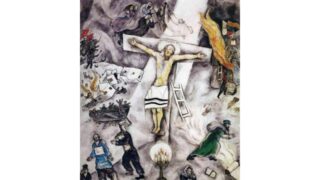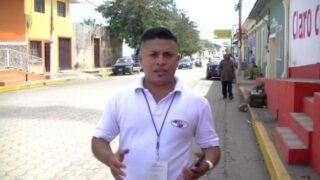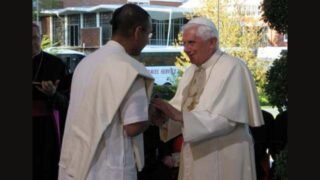As the coronavirus lockdown measures were eased, the CCP recommenced threats and intimidations against Catholics who refuse to join the Patriotic Church.
by Tang Zhe
On Easter eve, officials from the Religious Affairs Bureau raided the Holy Rosary Church in Fuzhou, a prefecture-level city in the southeastern province of Jiangxi. They pressured its leaders to join the Chinese Patriotic Catholic Church (CPCA), threatening to demolish the church, impose a fine of 200,000 RMB (about $ 28,000), and arrest its priest if the demand was not implemented. Before leaving, the officials ordered to remove the church name from the wall.
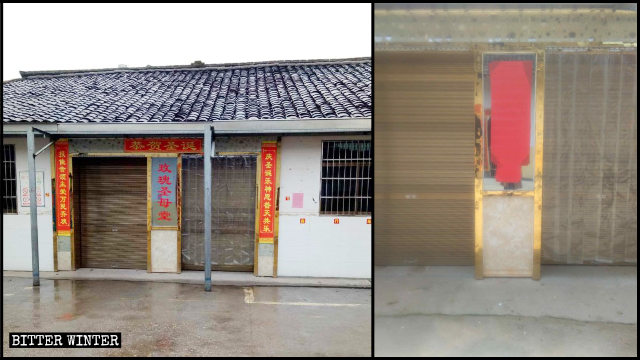

Two weeks later, the signboard “Holy Rosary Church” was covered, and all items used during Mass were hidden. The government banned services in the church already at the end of last year and has been surveilling it ever since.
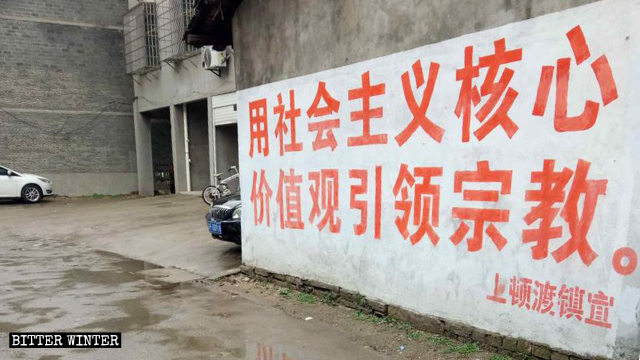

After authorities closed down an unregistered Catholic church in Fuzhou’s Chongren county two years ago, the congregation began assembling in the homes of its members. At the end of March, a churchgoer who hosted some of these gatherings was singing hymns with her granddaughter at home when government officials stormed in and ordered them to stop singing, threatening to punish the woman if she hosted religious services again. When the believer contacted the closed church’s priest to ask him to hold Easter Mass, he refused, fearing to be imprisoned if the government found out. The woman thinks that if it were not for the coronavirus outbreak, which has slowed down religious persecutions in China for a while, “we believers would all be arrested.”
The northern province of Hebei, China’s Catholic heartland, has been one of the primary targets of CCP’s religious persecution, pursuing nearly one million Catholics. At the end of 2019, the Hebei government issued a document demanding to reduce the number of unregistered Catholic churches further, intensifying crackdowns on places of worship and the clergy that are not part of the CPCA. The document also demands to intensify efforts in “transforming” unregistered bishops and priests to make them abide by the leadership of the CCP and the CPCA. The clergy should also comply with the Constitution, laws, and regulations, support the principle of an “independence and self-administered” Catholic Church in China, and stop holding religious activities that are not approved by the state.
The Vatican Guidelines of 2019, issued in June last year, following the Vatican-China deal of 2018, foresee that priests and bishops of what was known as the Underground Catholic Church may remain outside the CPCA for reasons of conscience. Regardless, the CCP uses any means possible to force all Catholics under its control.
A churchgoer from Zhangjiakou city told Bitter Winter that in May last year, the city government held 45 Catholic priests in a hotel for indoctrination, forcing them to join the CPCA.
This April, Religious Affairs Bureau and National Security Brigade personnel stormed into the house of an elderly Catholic in Zhangjiakou and ordered her to eliminate a chapel in her home, which she had installed for private congregation gatherings. After taking photos and registering her ID information, the officials threatened to fine the woman from 20,000 to 200,000 RMB (about $ 2,800 to 28,000) if she disobeyed. In early May, officials returned twice to question the woman about the whereabouts of the priest who used to come to the gatherings in the shrine. They forced her to sign a statement promising not to host religious services at home again and confiscated her bank card for government subsidies.
On May 8, officials emptied a Catholic meeting venue in the Gaocheng district of Hebei’s capital Shijiazhuang and cut off its electricity supply. They ordered the venue’s director to remove all religious symbols and threatened to confiscate the venue’s land if gatherings continued to be organized.


The government also demands CCP members, government officials, teachers, and members of state-run churches to visit believers from unregistered places of worship at home and persuade them to attend services lead by CPCA priests.
In late May last year, over 20 personnel from the Gaoyang county government in the prefecture-level city of Baoding, accompanied by the police, shut down a local unregistered church and expelled its priest, who used to live on the premises. They then visited over 80 congregation members at home, forcing them to sign an application to join the CPCA. If they refused, their pensions were threatened to be withdrawn, and their descendants prevented from going to college, enrolling in the army, or joining the CCP.
A church member remembers one of the officials saying that “You can’t win against the Communist Party; you are whatever the Party wants you to be. It can charge you with anything it wants and imprison you.”
At the start of 2020, the Religious Affairs Bureau of the northeastern province of Jilin issued a document, demanding to continue crackdowns on unregistered Catholic churches by organizing special investigations and intensifying control and transformation of the unregistered clergy.


